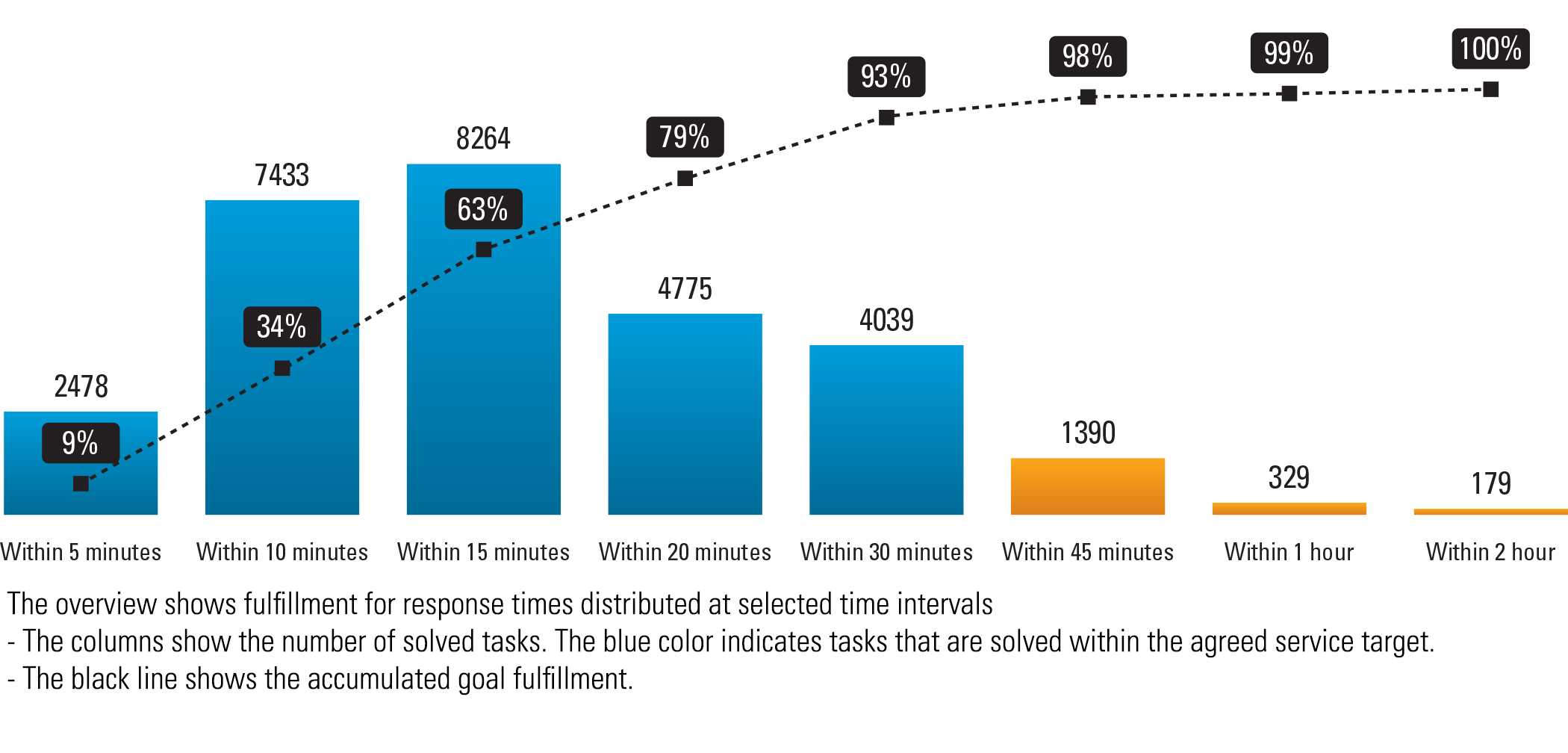Visual performance graphs that can be used to optimise the workflow
Faster, safer and more reliable service for patients
Greater flexibility and more efficient use of the hospital’s service resources

In the spring of 2018, North Zealand Hospital in Denmark implemented Columna Flow as part of the strategy to optimise their logistics operations through data management.
With the implementation, North Zealand Hospital has gone from manual to digital task management. A change that not only promotes efficient and silent workflows, but which also allows the hospital to learn from their performance data.
Tasks that were earlier requested via phone to either service coordinators or directly to the service assistants, are now submitted in Columna Flow. From their mobile device, service staff have instant overview of all task requests and can pick their next assignment based on proximity and priority.
”Digitisation of the whole process is in itself a huge gain for our logistics operations. What has been done and how it has been done are now both documented. This has significantly changed the way we collaborate with the different departments,” explains John Bjørn Olsen, Development Manager for Facility Management at North Zealand Hospital.
John Bjørn Olsen elaborates:
“The volume, frequency and speed of our service tasks have all improved, because we now have a clear picture of what we have to deal with.”Implementing Columna Flow has resulted in a far better understanding of how the North Zealand Hospital is utilising their resources and meeting the service targets. This information is not just relevant within the service department to improve their workflows. The data reports are also used to present department performance at the quarterly reviews with the Executive Board.

The way North Zealand Hospital makes use of data has led to organisational changes in terms of logistics, explains John Bjørn Olsen: “We can now move tasks between teams, with opportunities to ensure a good match with the particular skills available. This gives us a better focus on skills development among our service staff, which in turn creates more opportunities for the different teams and provides greater flexibility in our overall logistics setup.”
"These changes have been decisive. The service staff now know exactly where and how they can tackle the tasks they are presented with. Moreover, they now have a clear process for getting the tasks done in cooperation with the departments. This gives a completely different approach to tackling these tasks."
John Bjørn Olsen, Development Manager for Facility Management,
North Zealand Hospital, Denmark
Working with data has also had a significant impact on the way service and clinical departments collaborate in the day-to-day workflow.
Using performance data as a foundation for discussions enables service managers to analyse potential issues in how a given task is handled and allows all parties to discuss the factual situation instead of the experienced reality.
“Data means that we can now see where and how our service efforts were distributed in specific episodes,” explains John Bjørn Olsen.
Before the implementation of Columna Flow, communication between the different departments was slow, hierarchical and heavy. If a task was not dealt with correctly, the clinical staff went to their head of department, who took the issue to the service manager and from there to the service staff concerned.
The flow of communication has now been reversed, so it is the service managers who call in the departments for meetings, where they present how the service staff have performed, based on the data from Columna Flow.
"Previously, it was always a question of what we from the service team had been unable to deliver, or could do better. It could be that an operating theatre had not been cleaned on time, or that a patient had arrived late for an examination. After the implementation, we have a clear overview of when and how problems arose, and this can give rise to a good dialogue between the department and service staff," explains John Bjørn Olsen."It is a good example of where data has really contributed to improvements. Previously, we might have an idea about where the challenges were, but now we can actually document this with data."
John Bjørn Olsen, Development Manager for Facility Management,
North Zealand Hospital, Denmark
For North Zealand Hospital, having clear insights into the orders placed and the time for expected delivery has allowed service managers to optimise their processes. Data revealed that many tasks were ordered just before the lunch break, as part of ward rounds, or at shift change. The resulting peaks and bottlenecks meant that service staff were unable to deliver consistent quality throughout the day.